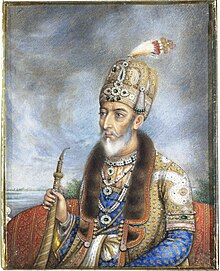Bahadurshah Zafar
| Bahadur Shah II | |||||
|---|---|---|---|---|---|
| Mughal Emperor Emperor of India Badshah |
|||||
 |
|||||
| 19th and last Mughal Emperor | |||||
| Reign | 28 September 1837 – 14 September 1857 | ||||
| Coronation | 29 September 1837 at the Red Fort, Delhi, Mughal Empire | ||||
| Predecessor | Akbar II | ||||
| Successor |
Empire abolished (Victoria as Empress of India) |
||||
| Born | 24 October 1775 Delhi, Mughal Empire |
||||
| Died | 7 November 1862 (aged 87) Rangoon (now Yangon), British Burma (now in Myanmar) |
||||
| Burial | 7 November 1862 Rangoon (now Yangon), British Burma (now in Myanmar) |
||||
| Spouse | Ashraf Mahal Akhtar Mahal Zinat Mahal Taj Mahal |
||||
| Issue |
Mirza Dara Bakht Mirza Mughal Mirza Fath-ul-Mulk Bahadur Mirza Khizr Sultan Mirza Jawan Bakht Mirza Shah Abbas 16 more |
||||
|
|||||
| House | Timurid | ||||
| Father | Akbar Shah II | ||||
| Mother | Lal Bai | ||||
| Religion | Islam | ||||
| Full name | |
|---|---|
| Abu Zafar nassurdin siddique Muhammad Bahadur Shah Zafar |
Mirza Abu Zafar Sirajuddin Muhammad Bahadur Shah Zafar (24 October 1775 – 7 November 1862) was the last Mughal emperor. He was the second son of and became the successor to his father, Akbar II, upon his death on 28 September 1837. He used Zafar, (translation: victory) a part of his name, for his nom de plume (takhallus) as an Urdu poet, and wrote many Urdu ghazals. He was a nominal Emperor, as the Mughal Empire existed in name only and his authority was limited only to the city of Delhi (Shahjahanbad). Following his involvement in the Indian Rebellion of 1857, the British exiled him to Rangoon in British-controlled Burma, after convicting him on conspiracy charges in a kangaroo court.
Zafar's father, Akbar II had been imprisoned by the British and he was not his father’s preferred choice as his successor. One of Akbar Shah's queens, Mumtaz Begum, pressured him to declare her son as his successor. However, The East India Company exiled Jahangir after he attacked their resident, in the Red Fort.
Bahadur Shah Zafar presided over a Mughal Empire that only ruled the city Delhi. The Maratha Empire had brought an end to the Mughal Empire in the Deccan in the 18th century and the regions of India under Mughal rule had either been absorbed by the Marathas or declared independence and turned into smaller kingdoms. The Marathas installed Shah Alam II in the throne in 1772, under the protection of the Maratha general Mahadaji Shinde and maintained suzerainty over Mughal affairs in Delhi. The East India Company became the dominant political and military power in mid-nineteenth century India. Outside the region controlled by the Company, hundreds of kingdoms and principalities, fragmented their land. The emperor was respected by the Company and had given him a pension. The emperor permitted the Company to collect taxes from Delhi and maintain a military force in it. Zafar never had any interest in statecraft or had any "imperial ambition". After the Indian Rebellion of 1857, the British exiled him from Delhi.
...
Wikipedia
